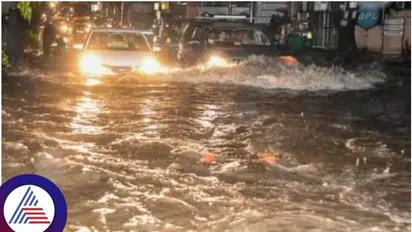Bengaluru: 1000 trees fall in 7 days as heavy rains wreaks havoc, BBMP set to auction trunks from spot

Synopsis
Bengaluru faced severe weather, resulting in over 1,000 uprooted trees, disrupting the city. To clear the debris efficiently, BBMP proposed auctioning fallen tree parts on-site. Transporting debris to dumping yards is challenging due to volume. Deputy Conservator BLG Swamy highlighted the benefits of direct sales. BBMP's swift response teams aided in clearing roads swiftly.
Bengaluru saw more than 1,000 trees uprooted during a week of severe weather, causing significant disruptions throughout the city. In response, the Bruhat Bengaluru Mahanagara Palike (BBMP) has introduced a unique solution: auctioning the fallen tree trunks and branches directly at their respective sites.
Between May 6 and May 12, the city was battered by heavy rainfall and strong winds, leading to the collapse of numerous trees across various localities. The fallen trees blocked roads and pathways, severely affecting traffic and pedestrian movement. In particular, a fallen tree branch on Nripatunga Road resulted in a traffic snarl lasting half an hour, highlighting the urgent need for efficient clearance mechanisms.
Rainfall mayhem: Bengaluru rains create chaos in traffic, Yellow alert issued in Karnataka for 6 days
To address this, the BBMP's forest wing has proposed a public auction for the trunks, branches, and stumps of downed trees right where they fell. This approach is aimed at avoiding the logistical challenge of transporting large tree parts to the city’s eight designated dumping yards, which has proven especially difficult given the sheer volume of debris, reported TOI.
BLG Swamy, the Deputy Conservator of Forests at BBMP, pointed out that transporting these heavy loads can be problematic, and the current resources, including eight tractors, are insufficient for the task at hand. “Selling the wood directly from the spot will not only clear the roads quicker but also help in managing our resources more effectively,” he explained.
Bengaluru tragedy: Car accident claims life of 5-year-old as teen driver pushes accelerator instead of brakes
In the aftermath of the storm, BBMP’s swift response teams, comprising 39 units, were deployed. They worked diligently to chop down the trunks and branches to clear the thoroughfares for vehicular and pedestrian traffic. This quick action was crucial in mitigating the impact on the city’s mobility and safety.
This initiative is currently pending approval from Tushar Giri Nath, the Chief Commissioner of BBMP. If approved, it could set a precedent for how cities can efficiently handle similar natural disruptions in the future, turning a problem into an opportunity for quick resolution and resource management.
Stay updated with the Breaking News Today and Latest News from across India and around the world. Get real-time updates, in-depth analysis, and comprehensive coverage of India News, World News, Indian Defence News, Kerala News, and Karnataka News. From politics to current affairs, follow every major story as it unfolds. Download the Asianet News Official App from the Android Play Store and iPhone App Store for accurate and timely news updates anytime, anywhere.